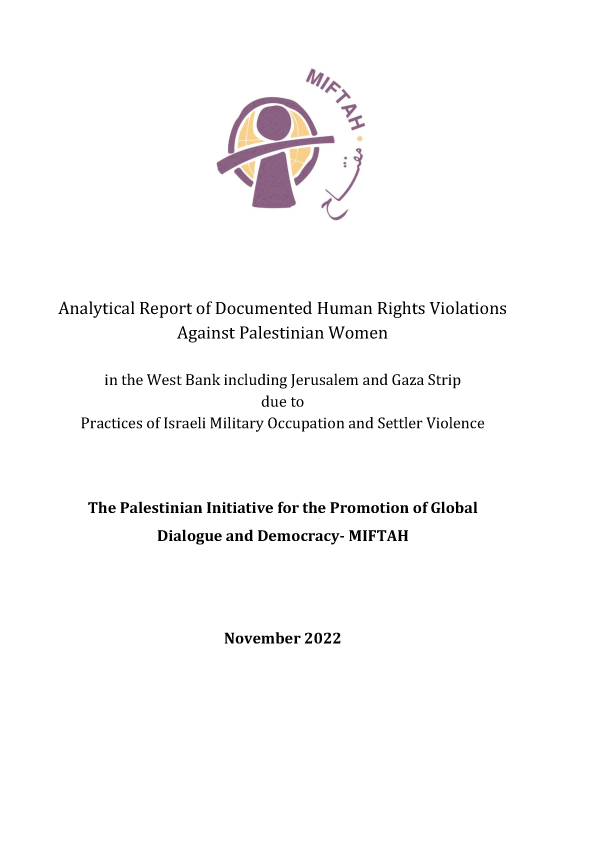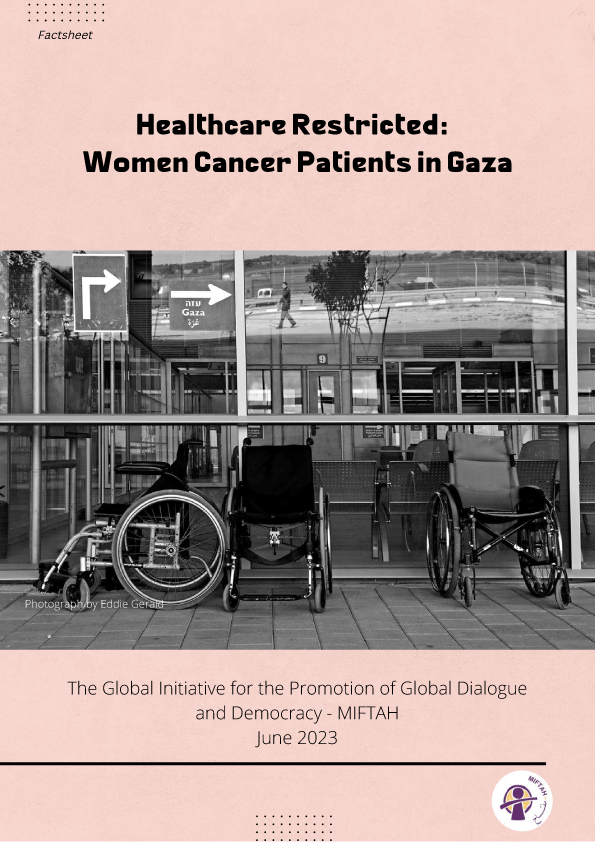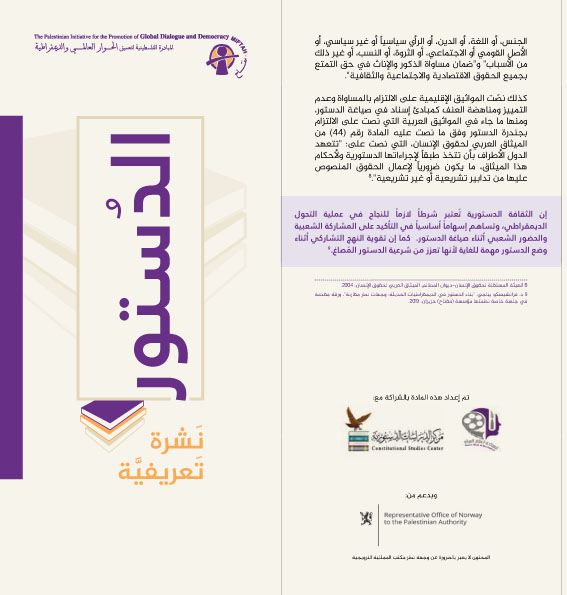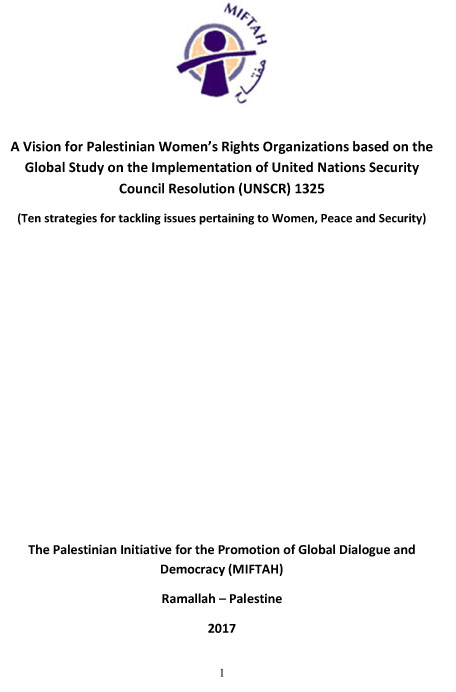MIFTAH views the flow of accurate information as a vital part of its mission. MIFTAH's fact sheets offer updated information and analysis on various topics on the Palestinian cause and the situation of women and girls in particular.
Factsheet - Fair Tax Monitor 2019-2024
Date posted: February 20, 2025
By MIFTAH
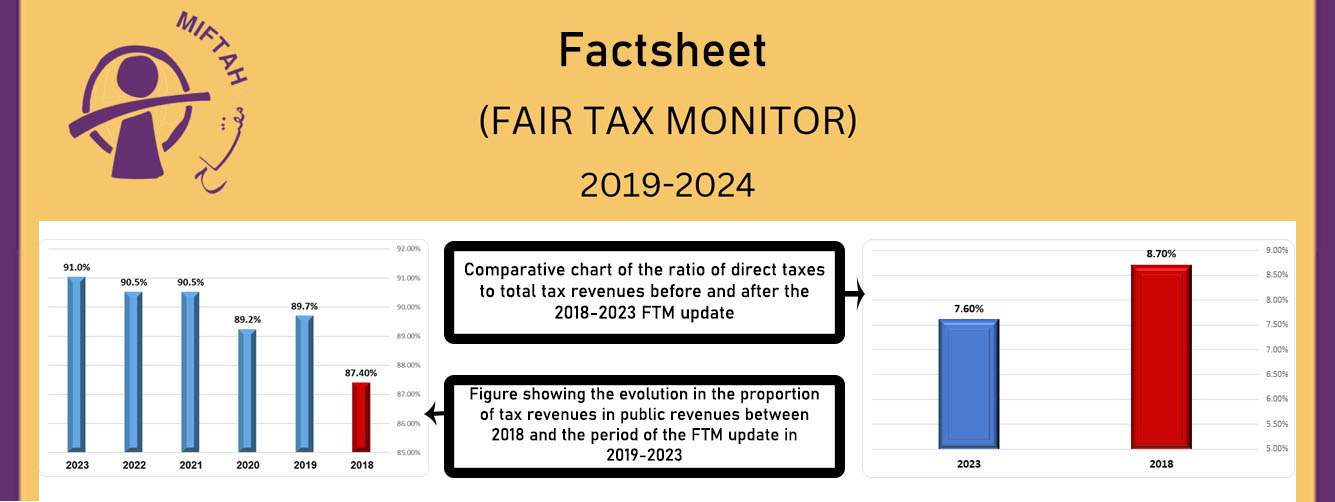
Introduction
The tax system is a financial and economic policy tool through which society's goals and objectives are realized based on its intellectual philosophy and ideology. Thus, the tax system is based on certain economic, social, and political pillars and foundations that differ from one society to another, from one country to another, and in the same country from one stage to another. Taxation has become not only a source of revenue for the state, but also a social and economic function, in addition to its traditional financial function, by becoming one of the economic tools through which economic development can be achieved, addressing inflation and stagnation, redistributing incomes, and raising the standard of living of citizens to advance the national economy in general .
The analytical review of the philosophy of tax systems shows that it is based on social, financial, and economic foundations. Its social function is to redistribute wealth to ensure social justice in the state, and to use tax revenues to achieve social stability and provide social services, and social protection for marginalized, vulnerable, and poor groups. Its financial function is to secure revenues for the state treasury to cover public expenditures, while its economic function is represented by the fact that it is a major tool of the state's fiscal policy, which it uses in order to stimulate economic growth, reduce inflation levels, protect the national economy, or stimulate some economic sectors, by imposing certain taxes, tax cuts, and others.
Based on these foundations and principles, the Palestinian tax system must achieve the philosophy of taxation by maximizing revenues, protecting the national economy, and, most importantly, achieving and enforcing social justice for all social groups . And responding to gender issues.
In 2024, the FairTax Monitor-FTM in the Palestinian Territories was updated, complementing the previous monitor’s data, which was published in 2018. The current update focuses on the years 2019-2024 and presents a set of conclusions and facts, the most important of which are:
To view the Full Factsheet as PDF
Factsheet on the status of Palestinian digital rights for CSOs and consequences of the genocide
Date posted: January 15, 2025
By MIFTAH
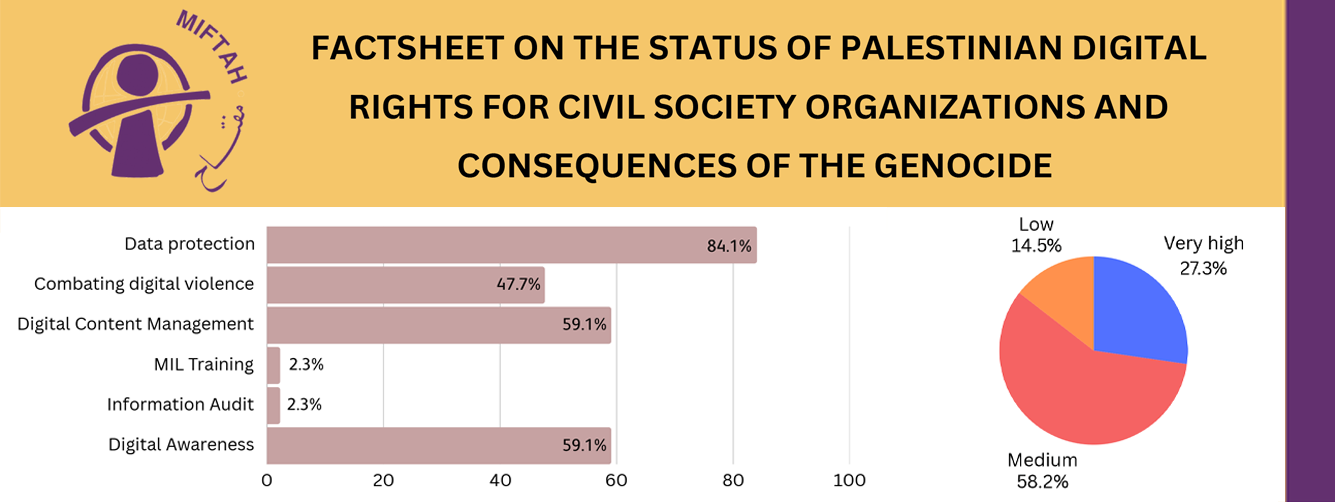
As part of its work in the field of public and digital diplomacy to expand global communication outreach in support of the Palestinian cause, MIFTAH conducted an assessment survey on the cognitive capabilities of civil society organizations (CSO) in the West Bank, including Jerusalem and the Gaza Strip, on digital rights and its implementation.
This survey reflects the complex reality of digital rights in occupied Palestine and assesses how prepared CSOs are in dealing with growing digital challenges, especially after the 2023 genocide. The survey sheds light on the gaps in digital knowledge and the infrastructure for digital security, which is a particular challenge, hampering the ability of institutions to protect their data and effectively carry out their role.
The survey is based on the descriptive methodology, including questionnaires from 55 institutions in the West Bank (including Jerusalem) and the Gaza Strip, in addition to in-depth interviews with six digital rights, women’s and other institutions working in the Gaza Strip. The qualitative data was analyzed using advanced tools such as Nvivo and SPSS.
Overview
According to the outcomes of the survey, CSOs target various sectors, with women being the most targeted sector at 43.6%, followed by children, at 16.4%, the elderly at 12.7% and youth at 10.9%. Meanwhile, persons with disabilities were targeted at 9.1% and media persons at 7.3%. Furthermore, the results of the survey showed that 34.5% of CSOs target all sectors indiscriminately, thus reflecting the comprehensiveness of the sample.
The scope of the work of Palestinian institutions is distributed within the districts as follows: Ramallah, at 50.9% of institutions, Hebron, at 40%, Jerusalem at 34.5% and Nablus at 38.2%. It also extends to the Bethlehem, Jenin, Tulkarm and Salfeet governorates at 29.1% each and the northern Jordan Valley at 32.7%, Jericho and the Jordan Valley at 27.3% and Qalqilya at 25.5%.
In the Gaza Strip, the work of CSOs in northern Gaza stood at 40%, Khan Younis at 29.1% Gaza City at 40%, Rafah at 25.5% and Deir Al Balah at 27.3%.
The locations of Palestinian CSO included in the survey were distributed among cities, camps and villages, with the majority of CSOs concentrated in cities, at 74.5%. Villages were the headquarters of 16.4% of the institutions while only 9.1% were based on camps. This distribution reflects the urban concentration of CSOs and highlights the need for increased presence in rural areas and in camps, to promote inclusiveness and access to marginalized and vulnerable sectors.
The size of Palestinian CSOs participating in this survey varied in terms of the number of employees. The survey showed that 27.3% of institutions include from one to 10 employees, while 16.4% have 11 to 15 employees. The largest majority of CSOs, 41.8% had between 16 and 30 employees while only 14.5% of institutions had over 31 employees. This distribution reflects the variety in size of CSOs, with most institutions either small or medium size, which is compatible with the survey sample.
To view the full Factsheet as PDF
Sexual violence as a weapon of genocide
Date posted: October 09, 2024
By MIFTAH
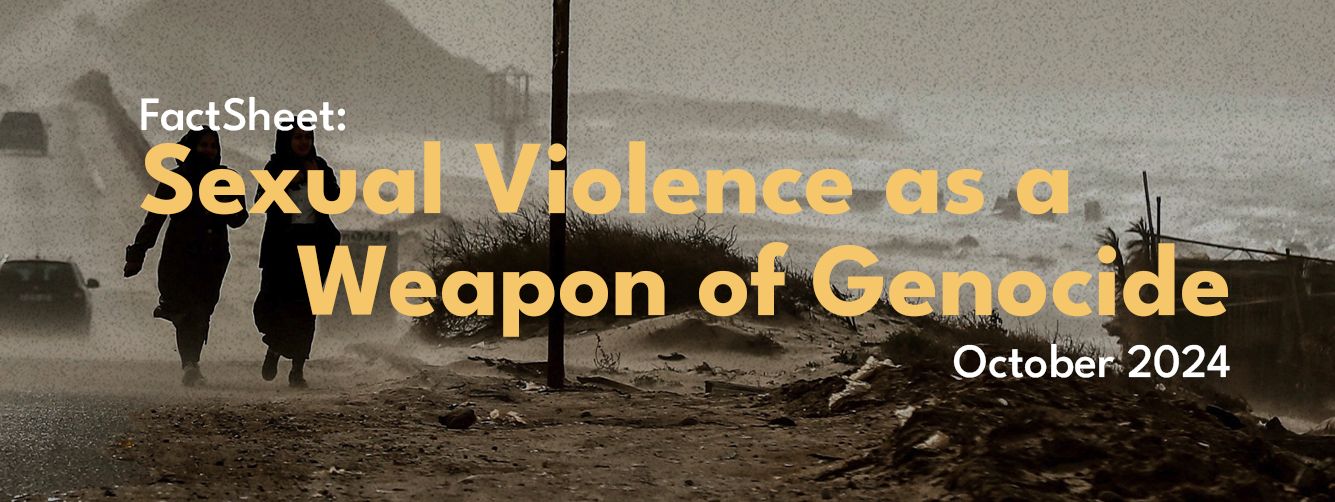
Background
Since the beginning of its illegal occupation in 1967, Israel has detained over 1 million Palestinians, who are tried in Israeli military courts with a conviction rate close to 100%. Israel also detains Palestinians with no charge or trial for an indefinite period under so-called “administrative detention”. This policy of mass arbitrary arrest is one of the tools used to maintain Israel's illegal occupation, apartheid regime and settler-colonial project.
To date, over 10,400 Palestinians have been arbitrarily arrested since October, 2023. The conditions of Palestinian prisoners have significantly deteriorated since the beginning of the Israeli genocide in Gaza, and imprisoned Palestinians are being subjected to torture, starvation, violent cell raids, including with tear gas, deliberate medical negligence, denial of food, water, sanitary pads and sanitation, as well as denial of lawyers and family visits.
Despite the absolute prohibition of torture and ill-treatment under international law, Israeli occupation forces and prison authorities employ various torture and ill-treatment techniques against almost all Palestinian political prisoners and detainees, including women and children, leaving grave physical and psychological damage. Israeli prison authorities, occupation forces and interrogators feel emboldened to commit such acts of torture with full impunity, knowing that neither the complicit Israeli legal system nor the international community will hold them accountable.
While sexual violence against Palestinian women and men has long been a tactic of torture at Israeli military checkpoints, during raids on their own homes and inside prisons, it has rapidly increased since the start of the genocide in Gaza. Palestinian women are often hesitant to share such stories, in fear of the associated social stigma, something which Israel exploits, and also due to the belief that Israel’s crimes will go unpunished.
Access the full factsheet here.
Healthcare Restricted: Female Cancer Patients in Gaza
Date posted: June 07, 2023
By MIFTAH
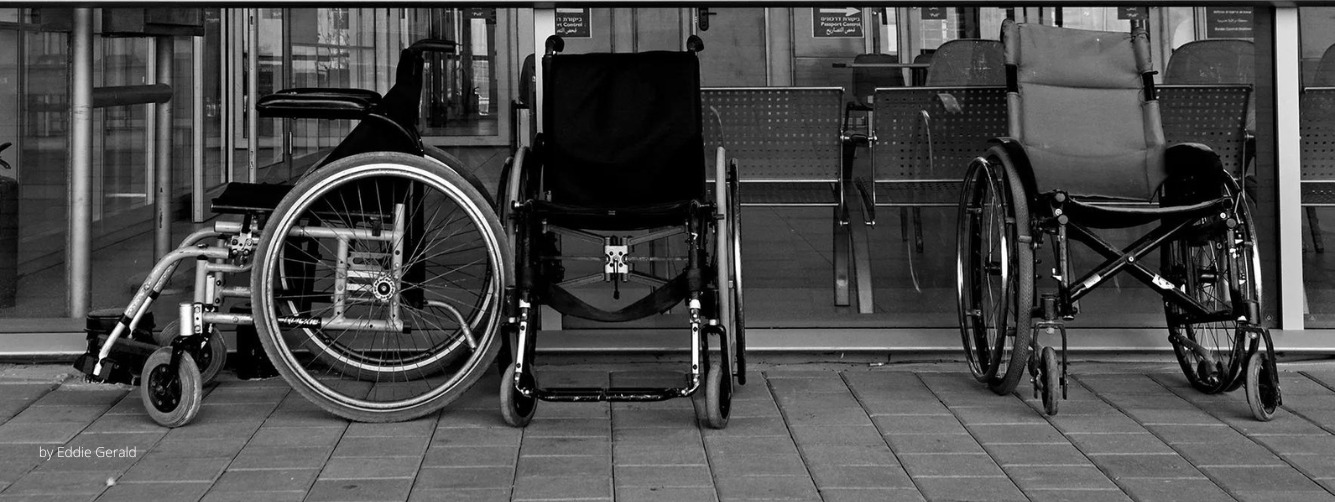
Background:
The Israeli-imposed siege and the frequent aggressions targeting medical facilities in Gaza have debilitated the health sector and its capacity to provide proper medical services. This is exacerbated in cases of chronic diseases, which gives rise to a need to leave the Gaza Strip to receive medical treatment in the occupied West Bank, including Jerusalem, or elsewhere. However, Israel imposes a strict and discriminatory permit regime, which has a disproportionate impact on medical patients given their conditions, and it is not unusual for these permits to be significantly delayed or ultimately refused by Israel.
The Palestinian Initiative for the Promotion of Global Dialogue and Democracy (MIFTAH) collected questionnaires from 102 women diagnosed with cancer in the Gaza Strip to assess the quality of the treatment, availability of equipment, accessibility, and referral process.
The full report is accessible here.
Conclusion and recommendations:
The 16-year-long Israeli-imposed blockade and closure on Gaza have had detrimental impacts on the health sector in the besieged Strip. Specifically, the siege has compromised the ability of the healthcare sector to deliver proper medical services due to the absence of crucial medication, equipment, and supplies under flimsy security pretexts. Ultimately, frequent aggressions and targeting of health facilities and the Israeli-imposed siege on Gaza compromise the availability, accessibility, and quality of healthcare services available to Palestinians in Gaza.
MIFTAH urges the international community to:
- Put an end to Israel’s impunity and hold it accountable for its persistent crimes, including the crime against humanity of apartheid, through the adoption of effective and concrete measures;
- Exert pressure to lift the blockade on the Gaza Strip and allow for the free movement of people and goods;
- Ensure the urgent implementation of UNSCR 1325 to provide immediate protection for Palestinian women and to put an end to Israel’s impunity;
- Support the UN Special Rapporteur in the oPt, the International Court of Justice’s advisory opinion, the ICC investigation and the UN Commission of Inquiry.
The summary factsheet is accessible here.
Financial indicators for the Family Protection Bill
Date posted: May 17, 2023
By MIFTAH
![]()
The legislation of the family protection bill is aimed at the protection of the family itself as an institution, and to guarantee its preservation. Palestinian legislators are aware of the importance of this bill, which is why all ministries and official institutions committed to developing its relevant programs, policies and plans, each according to their field of expertise. Their goal is to contribute to the promotion of a culture that combats domestic violence and encourages the response of public policies to this objective, through education, health, legislation and the media. Another objective is to track the bill’s impact and periodically assess it in cooperation with other civil societies. This paper focuses on some of the financial indicators pertaining to this bill.
All family members in Palestine are subjected to violence, including children, minors, women and men. However, married women remain the sector most vulnerable to domestic violence according to a 2019 Palestinian Central Bureau of Statistics survey. It said 29.4% of married women had been subjected to at least one type of violence by their husbands as opposed to 13% of men who had been subjected to violence by their wives, by their own confession. A total of 44.7% of individuals who have never been married have been subjected toviolence;7.6% of the elderly and 44.2% of children(12-17yearsold) were the victims of violence at the hands of one of their parents. Although a high percentage of women have been victims of violence from their spouse, a considerable percentage of these women, around 60.3% preferred to stay silent about the assault. Only a small percentage of women asked for help through official avenues; 2.9% went to a defence lawyer to file a lawsuit against their husbands, 1.3% went to the police or a family protection unit and 1.4% went to the centres for mental, social and legal aid.
Financial indicators for the Family Protection Bill
| Article of Bill/Law by Decree | Relevant party | Estimated cost |
| Article(4) specialization of Ministry of Social Development: The Ministry, in cooperation with government and civil society organizations, provide the following services to victims of domestic violence: 1.Protection and fulfilment of needs of the victim; economically and socially empowering her and reintegrating her in society in order to preserve the family fabric, while ensuring not to equate the victim with the perpetrator. 2.Appointing protection counsellors in all directorates and qualifying them to deal with domestic violence cases 3.Providingsocial, psychological and legal experts to provide victim support 4.Ensuringthe provision of social, psychological, health and legal services to domestic violence victims in coordination with relevant parties. 5.Preparing rehabilitation programs for perpetrators of domestic violence crimes 6.Coordination and cooperation with government and civil society organizations to provide the necessary training for the enforcers of this law by decree. Preparing the necessary preventative plans and programs against domestic violence |
Ministry of Social Development | ILS12 million over 3 years on average of ILS4 million year, based on a study prepared by the Ministry of Social Development |
| Article 6: Family and Minors Protection Police: In accordance with the provisions of this bill/law by decree, a family and minor protection police will be established, with branches set up in all districts of the homeland. It’s specializations are the following: 1.Goingtothe place of the domestic violence incident when the informer states that the violence has occurred, is about to occur is ongoing; or in case of violation of a restraining order, even if the informer is not the victim 2.Providingfree 24-hourhotlinestohelp victims |
Palestinian police and Family and Minors Protection Department
Reform and Rehabilitation Centres Department |
ILS7.3 million/year (the study is based on the number of those working in the family and minors protection department and their mean salary)
ILS1.3 million/year (the study is based on the number of those working in reform and rehabilitation enters, which includes special sections for women boarders) |
| Article7: Family Protection Prosecution 1.In accordance with the provision of this bill/law by decree, a prosecution’s office will be established to follow up on domestic violence cases in all districts and will operate under the supervision of the Attorney General in accordance with penal measures in force. 2. This family protection prosecution office will promptly investigate domestic violence incidents while also preserving the privacy and dignity of the victim |
Family Protection Prosecution | ILS1.7 million, based on the number of relevant prosecution agents and their mean salaries |
| Article10: parties qualified to issue restraining orders 1.Restrainingorders will be issued by the following parties of their own accord: a. Family Protection Prosecution b. The presiding judge |
Presiding judges | ILS1.9 million, based on the number of judges and their mean salaries |
| Total expected estimated cost | ILS16.2 million |
The table above shows that the estimated and main additional cost of the Ministry of Social Development to be around ILS4 million a year, considering that the other parties (police, prosecution and courts) are currently carrying out their roles without fully allocating specialized departments for protection from violence. However, if these parties do allot specialized departments for protection from violence, overall costs will reach approximately ILS16.2 million. Nonetheless, even if this cost is incurred, it still only comprises a small part of public expenditures, approximately 0.1%. Overall public expenditures for 2022 amount to approximately ILS16.2 billion, which means the cost of passing this bill and implementing its provisions will not constitute financial burden on the general budget and will not be an obstacle to ratifying the law by decree.
Furthermore, it should be noted that while it is imperative to calculate some of the costs resulting from violence against women, the reaerate the high costs as well. The secret social costs, which impact society as a whole. Data from the Ministry of Social Development showed (see graph), that violence exercised against women has prompted around 60% of them to flee their homes. Also, 18% of them attempted suicide in addition to suffering from mental and physical illnesses, unwanted pregnancies or others. Calculating expenses incurred from violence is not an easy process and there are no national data or figures that can measure the impact violence has on the state’s general budget due to the prevalent mentality towards violence as an issue associated only with women. This is especially true when the conversation is about the indirect and intangible effects of violence, including:
Violations of human rights; negative social, economic and political impacts; working women who get sick and need to take sick leave; lack of focus and productivity; impact of violence on children and academic failure; the rise in the percentage of school dropouts among children; the rise in long-term unemployment rates; the percentage of homeless children who become a burden on society; government expenditures for medical treatment; safehouses; therapy; monitoring cases of violence against women; individual expenses for following up on legal cases and lawyer fees; loss of income because of repeated absence from work or inefficacy; social expenses resulting from the breakup of the family; expenses of training individuals on how to deal with cases of violence; expenses for issuing laws and legislation on the protection of women from violence.
Confirmation of the above is that the UN believes the economic, social and health costs of violence against women are, to a large extent, undocumented and unrecognized. However, these remain colossal, according to researchers, specialists and defenders of women’s rights.
To view the full factsheet as PDF
Israeli state-sanctioned settler terrorism: A gendered lens
Date posted: April 26, 2023
By MIFTAH
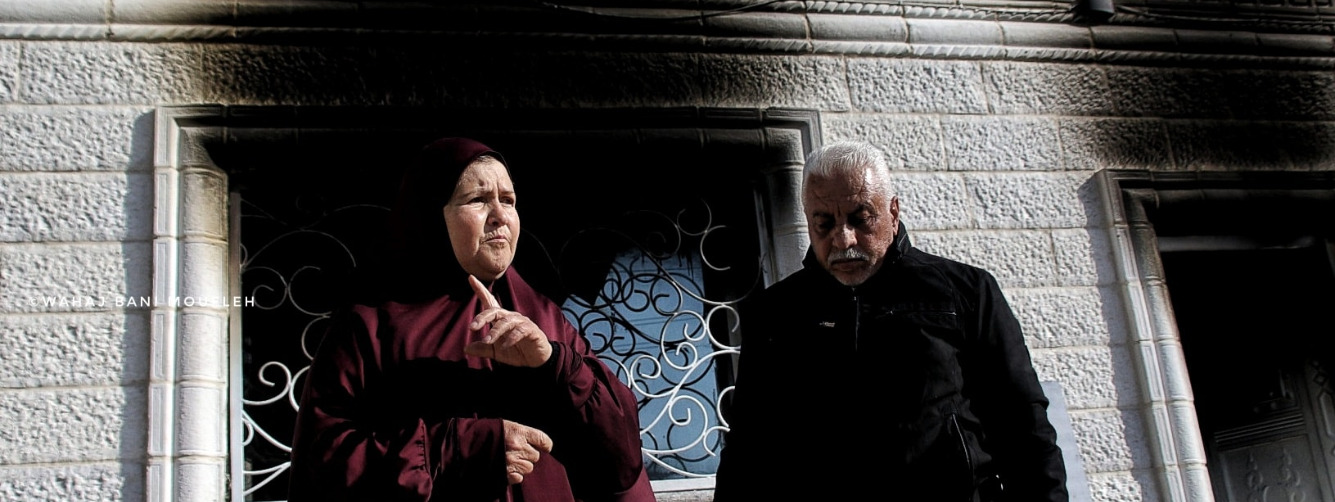
Background:
The illegal Israeli settlement project, including settler-only bypass roads, military checkpoints, and the annexation wall, continues to expand and steal more Palestinian land and resources. As of today, the number of illegal Israeli settlements in the occupied West Bank, including Jerusalem, is close to 300, with around 750,000 Jewish settlers residing in them.
Israeli state-sanctioned settler terrorism against Palestinian civilians and property is prevalent and has been on the rise in recent years. Violence takes the form of psychological, physical, and verbal violence, including beating, throwing stones or sharp tools, intimidation, shooting, verbal assaults, and assaults on agricultural lands, cars, and homes. Such attacks are committed in the presence of Israeli occupation forces who often join them.
The high frequency of these forms of violence and their persistence give rise to psychological, physical, and material harm. Palestinian survivors of settler terrorism seldom press charges and file complaints against Israeli settlers given the complicity of the Israeli law enforcement system.
The Palestinian Initiative for the Promotion of Global Dialogue and Democracy (MIFTAH) and the Women’s Center for Legal and Counseling (WCLAC) collected questionnaires from 229 Palestinian women covering settler violence in the occupied West Bank governorates of Al-Khalil/Hebron, Bethlehem, and Jerusalem.
MIFTAH calls on the international community to:
Put an end to Israel’s impunity and hold it accountable for its persistent crimes, including the crime against humanity of apartheid, through the adoption of effective and concrete measures;
Stop all relations and trade with illegal Israeli settlements including international companies that profit from them;
Criminalize and blacklist Israeli settler groups that engage in terrorist activities and hold those with dual citizenship accountable in their respective states;
Ensure the urgent implementation of UNSCR 1325 to provide immediate protection for Palestinian women and to put an end to Israel’s impunity;
Support the UN Special Rapporteur in the oPt, the International Court of Justice’s advisory opinion, the ICC investigation and the UN Commission of Inquiry.
Factsheet on impact of Israeli violations against the right of education for girls in Jerusalem
Date posted: June 28, 2022
By MIFTAH in cooperation with Women's Studies Centre

Palestinians in general, face attempts by the Israeli occupation to “Israelize” the curriculum in Jerusalem and to stifle the Palestinian national identity, through various measures. This is amid scarce financial resources, substandard buildings, and largely unsuitable educational facilities, in addition to the multitude of references associated with education in Jerusalem.
This factsheet focuses on the status of education in the city in terms of student and school distribution and approved curriculum, with a focus on the right of girls to education.
Facts and figures:
- Based on findings by the Jerusalem Affairs Unit for 2018-2019, 59.2% of all schools are overseen by the Palestinian Ministry of Education in East Jerusalem and suburbs under Israeli jurisdiction. In contrast, 40.8% of schools are overseen by the Israeli Ministry of Education and the illegal [Israeli] Jerusalem municipality.
- There is a shortage of 3,794 classrooms in Jerusalem (Palestinian and Israeli schools) including 2,100 in Palestinian schools alone, or 55.3%.
- The distribution of schools under the supervision of the Palestinian Ministry of Education is as follows: 35.3% private schools, 21.4% Islamic Waqf schools, and 2.5% UNRWA- run schools. Meanwhile, 9.7% of schools are run by the Israeli Education Ministry and illegal municipality, recognized as contacted ‘semi-government” schools and 31.1% are directly under the jurisdiction of the Israeli Education Ministry and illegal municipality, according to 2020-2021 data.
| Reference | Number of schools/Number of students |
| Waqf-run Schools | 51 girls and boys schools/ 10,851 students |
| Private Schools | 84 girls and boys schools/33,684 students |
| UNRWA-run schools | 6 girls and boys schools/1,953 students |
| Schools under direct Israeli supervision | 74 girls and boys schools/40,573 students |
| Contracted schools: schools owned and run by individuals on behalf of the Israeli Education Ministry and illegal Municipality | 23 girls and boys schools/2,734 students |
Palestinian students in occupied Jerusalem in general, suffer from repeated attacks by Israeli occupation authorities, resulting in lost classes, especially in the morning.
| Indicator | Percentage |
| Average area for students in Jerusalem | 0.5-0.9 m2 per student |
| Increase rate of students per school year | 5-8% |
| Number of female school drop-outs in 2019-2020 school year | 305 students |
| Number of attacks by Israeli occupation forces on Waqf schools alone in the 2017-2018 school year | 483 attacks |
| Number of classes wasted in 2017-2018 in Waqf schools alone | 2,016 morning classes |
| Percentage of students who pass daily through military checkpoints into Jerusalem | 20% |
| Percentage of (male and female) students who use public transportation to reach their schools in Jerusalem | 65% |
Interviews with students, experts and parents:
Interviews were individually conducted with 20 students and 10 students in a focus group. The individual interviews were intentional in that the researcher approached students who were subjected to one form of harassment. However, during the interviews, it became apparent that most of the girls had been subjected to more than one form of harassment. The interviews also included 17 involved individuals: six school principals, two counselors, three experts (one male and two female) and six parents (two men and four women).
Interview results:
- Unfriendly-environment schools for students…the role of the racist, separation wall in hampering and disrupting the educational process in Jerusalem
Subject Students Percentage Experts and parents Percentage Unfriendly-environment schools for students 22 73.33% 13 76.47% Racist separation wall hampering and disrupting the educational process 29 96.66% 17 100% - Harassment of Jerusalemite students on their way to school
Subject Students Percentage Experts and parents Percentage Harassment at military checkpoints 16 53.33% 12 70.58% Harassment on crowded public transportation 20 66.66% 11 64.70% Harassment by soldiers in the Old City streets 7 23.33% 5 29.41% Various forms of harassment at military checkpoints or in streets by soldiers or settlers 15 50.00% 14 82.35%
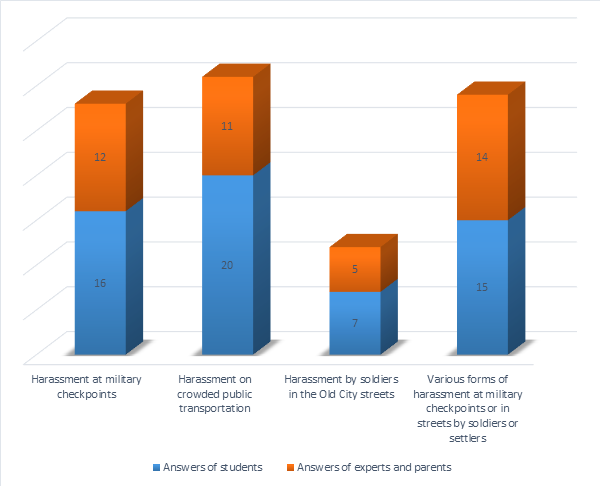
To View the Full Factsheet as PDF
The content of this document does not reflect the official opinion of the European Union. Responsibility for the information and views expressed in the study lies entirely with MIFTAH
Israeli torture of Palestinian prisoners: Systematic cruelty in a climate of total impunity
Date posted: June 25, 2022
By MIFTAH

Background:
Since the beginning of its illegal occupation in 1967, Israel has detained over 1 million Palestinians. This policy of mass arbitrary arrest is one of the tools that aim at maintaining Israel's illegal occupation and apartheid regime. Every year, Israeli occupation forces detain thousands of Palestinians, including women and hundreds of children. As of today, there are 4,700 political prisoners in Israeli jails, including 640 administrative detainees, 32 women and 170 children.
Every year, June 26 marks the International Day in Support of the Victims of Torture. Despite the absolute prohibition of torture and ill-treatment under international law, Israeli occupation forces and prison authorities employ various torture and ill-treatment techniques against almost all Palestinian political prisoners and detainees, including women and children, leaving grave physical and psychological damage.
Israeli prison authorities, occupation forces and interrogators feel emboldened to commit such acts of torture with full impunity knowing that neither the complicit Israeli legal system nor the international community will hold them accountable.
Recommendations:
MIFTAH calls on the international community to:
- to meet its obligations under international law and universal jurisdiction to hold Israel accountable through effective measures for its persistent crimes and human rights violations
- support the investigation by the International Criminal Court into the Situation in Palestine, including the crime of torture
To view the Full Factsheet as PDF
Family rights for Jerusalemite women under discriminatory Israeli policies
Date posted: June 21, 2022
By MIFTAH in cooperation with WCLAC

Introduction:
Israeli occupation authorities in Jerusalem continue to enforce punitive and discriminatory measures against Palestinians and to violate their human rights. These include: house arrest of minors, restrictions on the freedom of movement, ID revocation, forced displacement, home demolitions and rejection of family reunification applications, all of which have disproportionate impact on women, who endure the most responsibility in caring for the family.
Women with Palestinian IDs who are married to Jerusalemite ID holders are faced with numerous measures that restrict their movement, thus preventing them from exercising normal lives. Palestinian women, holding Palestinian IDs, in Jerusalem are prevented from living with their Jerusalemite husbands who have “blue IDs’ and, in the case of divorce, are also prevented from remaining in Jerusalem, putting them at risk of losing custody over their children, not living in the same city or even being able to visit them. This is because entry into occupied Jerusalem requires permits that can only be obtained with approval from Israeli authorities, particularly residency permits for women with Palestinian IDs.
These require renewal by their husbands, which is not feasible in the case of divorce.
These discriminatory Israeli measures towards Palestinian women based on their IDs, which in any case, is determined by Israeli authorities, is one reason for domestic violence. The accumulated hardships on women pose risks for them and oftentimes forces them to endure marital relations rife with violence. What makes matters worse is that they do not always report this violence for fear they will be deported from Jerusalem, lose custody of their children in the case of divorce, or have their residency revoked. This leads to further subordination and control by the husband over the fate of women in general.
Statistics:
- According to 2021 statistics from the Women’s Center for Legal Aid and Counseling (WCLAC), 70% of women who requested legal and social services in Jerusalem, have different IDs than their husbands, or West Bank IDs, which resulted in increased violence against them – neither are they able to secure court orders in their favor nor are they able to leave their husbands since they risk losing their children, which leaves them with they only option they feel they have: to remain in a violent cycle.
- In 2021, WCLAC, documented 120 cases on the impact of Israeli human rights and international humanitarian rights violations against women. One focus was on women in Jerusalem, especially pertaining to home demolitions, settler violence, access to services, ID revocations and forced displacement.
- Through this project, (2021-2022) 30 testimonies were collected and documented, of which 28 were adopted after selection and review. The testimonies included women’s issues (women voices) from various geographic area of occupied Jerusalem and its suburbs, including 16 women from Jerusalem neighborhoods such as Ras Amoud, Jabal Mukabber, Beit Hanina, Silwan, Sur Baher, Wadi Joz and Sawahra Sharqiya, 2 women from Beersheba, one woman living in Jordan, who is banned entry into Palestine and 10 women residing in the Old City of Jerusalem.
- The age group of women victims of racist policies, discriminatory laws and domestic violence was between 22-60 years of age. Their social status was as follows: 17 married, two widowed, one pending divorce, one separated and six divorcees.
- The center classified all of these issues as complex violations in that they entail domestic violence and Israeli discriminatory practices and law pertaining to women’s domestic rights and family reunification. Moreover, domestic violence usually entails husbands forcing women to forfeit their rights guaranteed in the marriage, including custody of the children, which is in contravention with CEDAW and national laws.
- Domestic violence includes physical and economic violence by the husband or any other family member such as a brother or father. It also includes forcing a woman into an early marriage and depriving her of the right to education. In this study, there were two cases of polygamy, one of which resulted in the wife being stripped of her right to citizenship and all other civil, social and economic rights. As for discriminatory laws and policies, these are represented in, but not exclusive to the “proof of residency” law and related policies, such as revocation of insurance, refusal to renew ID cards, ban on entry to Palestine and demolition orders (currently two cases).
- Over 40,000 family reunifications in Jerusalem have been rejected since the ratification of the ‘Citizenship Law” of 2003, which is a racist discriminatory law in violation of Article 9 (1) of CEDAW. This law is aimed at preventing residency or granting citizenship to any person from the Palestinian territories occupied in 1967 who is married to a Palestinian citizen with a Jerusalem ID or Israeli citizenship, thereby barring Palestinians from entering Jerusalem or areas inside the Green Line. This hinders women from living with their Jerusalem-ID husbands. If the woman is the Jerusalem ID holder and she moves to the West Bank to live with her Palestinian ID-holder husband, she is then at risk of losing her ID and being stripped of her rights, health insurance and social and educational security.
“Citizenship” Law:
- Israel passed a new Citizenship Law on March 10, 2022, meant to reinforce its apartheid system, with a majority of 45 to 15 votes and to restore most of the previous legislation from the 2003 Citizenship Law, which expired on July 6, 2021. At the time, the government coalition failed to secure the necessary majority for its renewal. (Jerusalem Legal and Human Rights Center, March 22, 2022)
- The law, in both its forms, stipulates the prevention of Palestinians in occupied Jerusalem or inside the Green Line from applying for family reunification for their spouses from the West Bank or Gaza Strip unless the husband is over 35 and the wife over 25. The ban includes residents and citizens from Syria, Iraq, Lebanon and Iran as well, which the law classifies as ‘hostile states.” Thus, According to Article 3 of the law, Palestinian women under 25 and men under 35 are prohibited from living with their spouses in Jerusalem or behind the Green Line. The law stipulates possible exceptions for ‘humanitarian’ reasons to be determined by a “humanitarian committee” appointed by the [Israeli] interior minister, on condition that these exceptions do not exceed 58 applications overall (irrespective of the overall number of applications), which is the number of exceptions already granted in 2018 (Article 7 z). Humanitarian reasons could include domestic violence (Article 7 c) or if one spouse holds Syrian citizenship and is married to a permanent resident of the occupied Golan Heights (Article 7 1). (Jerusalem Legal Aid Center statement, March 22, 2022)
- In the case a woman without a Jerusalem ID marries, any family reunification application submitted by her family (if they also hold Jerusalem IDs) is halted and her husband must reapply.
- Women who hold West Bank ID’s do not have the right to apply for family reunification. Only the husband who holds a Jerusalem ID or Israeli citizenship can apply, even if she meets all of the necessary requirements for the application and is capable of proving her place of residence.
- In the case of domestic problems, which result in divorce, the wife must reapply for family reunification via her family once again as long as the Israeli interior ministry does not hinder this application given that she is an adult of legal age.
Polygamy:
- Men who hold Jerusalem IDs or Israeli citizenship and who seek multiple wives, circumvent the law by divorcing the first wife in Israeli courts and then remarry her in Jordanian [Sharia] courts.
- If either the first or second wife has a Palestinian ID, Israeli law grants the right to register the children in the father’s ID if he who holds the Jerusalem ID, and not with the mother, which is often not in the child’s best interests.
Custody:
- If the mother is not granted family reunification, this makes it difficult for her to move around the city and follow up on her children’s affairs in official institutions in Jerusalem. If she does have family reunification, in most cases, the husband stops the application and deprives her of obtaining a residency permit, since custody issues are usually raised during marital disputes.
Alimony:
- If the wife or divorcee has a Jerusalem ID and the husband a Palestinian ID, the provisions for alimony are not applicable, which forces women to file alimony cases in Palestinian courts, the ceiling for which is much lower than in Israeli courts.
Problems in implementing Court Orders:
- If the husband or divorcee has a West Bank ID and resides in an area behind the annexation wall, even if these areas are under Israeli control, Israeli police do not enforce court orders. Instead, the Jerusalemite wife is referred to the liaison office. Oftentimes, Palestinian parties refuse to implement any orders issued by Israeli courts on the premise that they are foreign verdicts, which do not adopt the principle of reciprocity.
Statistics:
- According to information from the Israeli interior ministry, only five family reunification applications were not considered in 2014; in 2015 the number of pending cases rose to seven and in 2016, they dropped again to four. In 2017, the number of pending cases was also four and in 2018 there was a spike in this number, to 56, consistently rising in 2019 to 79. In 2020, the number of pending cases jumped
- to 574.
- WCLAC also offered support to a Jerusalemite woman activist living in Sheikh Jarrah, by training her to present her story to international delegations. On July 16, 2021, she, along with WCLAC, participated in a podcast with a Women’s International League for Peace and Freedom program. The episode revolved around the impact of war on women and girls in which she presented her experience during the recent events in Jerusalem’s Sheikh Jarrah neighborhood.
- In 2021 and beyond, WCLAC conducted a comprehensive eight-day training for two groups of women activists and intern Sharia lawyers in Jerusalem, targeting 26 women in all. Another training was held in the Hebron district, which targeted 16 women. The meetings focused on the subject of protection, legal and social rights in Jerusalem, gender, women’s rights guaranteed by law, the conflict of laws and its impact on women, the personal status law, marriage licenses and their stipulations, gender-based violence, the concept of protection from violence against women, cybercrimes, inheritance and facilitation skills.
- The Center selected 29 women from Jerusalem and Hebron and offered them support to hold awareness sessions for other women in their communities. The women carried out 37 meetings, targeting 610 women.
- Based on this, in 2021, awareness sessions were held that targeted communities in marginalized areas, by targeting 60 male and female participants from communities in villages northwest of Jerusalem (Rafat and Beit Anan).
*This paper was prepared in cooperation between WCLAC and MIFTAH
To view the Full Factsheet as PDF
The content of this document does not reflect the official opinion of the European Union. Responsibility for the information and views expressed in the study lies entirely with MIFTAH
Beyond an illegal Occupation: 55 years of Full Impunity & Zero Accountability
Date posted: June 05, 2022
By MIFTAH

Background: On June 5, 1967, Israel took control of the rest of historical Palestine by occupying the West Bank, including Jerusalem, and the Gaza Strip. The United Nations Security Council adopted several resolutions calling for the end of Israel's occupation (including Resolution 242 which called for full Israeli withdrawal) which remain unimplemented. Israel’s illegal occupation has transformed into de facto annexation (de jure in Jerusalem since 1980) and is part of its apartheid regime applied across historical Palestine.
The brutal Israeli occupation is characterized by perpetual unchecked crimes and human rights violations and is maintained by various means, such as killings, mass arbitrary detention, home demolitions, forced displacement, construction of illegal settlements, a network of military checkpoints, theft of land and resources, and state-sanctioned settler terrorism. As recently stated by an Israeli army commander: "the army and the settlements are one and the same".
For 55 long years, the Israeli occupation continues with full impunity and no accountability, due to international inaction and double standards. Despite decades-long calls by Palestinians and reports by the most reputable human rights organizations, the world remains silent on the longest military occupation in modern history.
Recommendations:
MIFTAH urges the international community to:
- Hold Israel to the same standard as other states and end its exceptionalism
- Hold Israel accountable for its persistent crimes and human rights violations through effective and concrete measures
- End the Israeli occupation and lift the land, air and sea blockade of the besieged Gaza Strip
- Support the investigation of the International Criminal Court into the situation in Palestine
- Stop trade and all relations with illegal Israeli settlements
- Hold Israeli settlers with dual citizenship accountable in their respective states
To view the Full Factsheet as PDF
14 Emil Touma Street,
Al Massayef, Ramallah
Postalcode P6058131
P.O.Box 69647
Jerusalem
972-2-298 9490/1
972-2-298 9492
info@miftah.org



